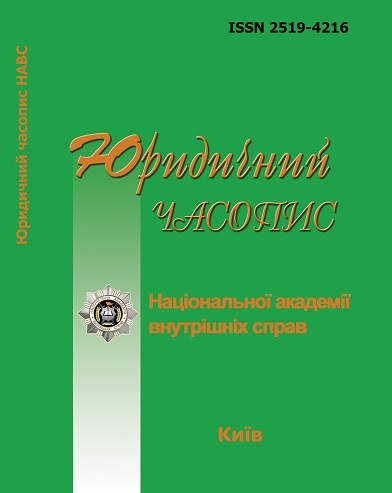The Problems of Intellectual Property Security in Ukraine
Abstract
The article deals with the urgent problems of security and protection of intellectual property in the state. In today’s society, there is a growing need for the protection of commercial information, as industrial espionage has laid deep roots in our country as well. The experience of industrialized countries suggests that the most effective measures to prevent cybercrime are the strengthening of the legislative component, the interaction of law enforcement agencies and units, as well as active cooperation with commercial services of private firms in Ukraine.
Successfully engage in production, and even survive in a fierce competition is possible only by acquiring and exploiting new ideas that contribute to increasing the efficiency of production costs.
The level of competitiveness to a large extent depends on the ability to protect its business and technological information from theft, unauthorized use, alteration or destruction.
And if you need to buy the hardware, then the software can be not only bought, but also copied easily. Consequently, this kind of intellectual property is subject to reliable protection.
When taking measures to protect against unauthorized access to information, one should not seek to protect the entire building, as it requires too much money and effort for further control. It is advisable to identify the places where you need to install hidden surveillance cameras. Where it is possible to separate geographically the services in which new information is generated, for example, research departments, laboratories. To work with classified information should be allocated special insulated premises, access to which is allowed only to certain persons.
An important role in protecting information is played by moral and ethical standards. They usually include the rules of conduct that have developed in a team of specialists of a particular commercial structure and which are not mandatory, such as legislative norms,but their non-compliance leads to the loss of authority (image) of a person, group of experts, the entire organization. These norms may appear as unwritten (generally accepted norms of honesty, decency, patriotism), and are formalized in the form of a charter or corresponding regulations.
The selection, training and organization of the work of the personnel is important. Experts advise to select the candidates for work in the firm, taking into account the requirements of protection of intellectual property, to check their reliability, at least by obtaining recommendations from known organizations or individuals.
Downloads
Abstract views: 166 PDF Downloads: 64
Copyright (c) 2018 Law Magazine of the National Academy of Internal Affairs

This work is licensed under a Creative Commons Attribution-NonCommercial-NoDerivatives 4.0 International License.
- Authors reserve the right to authorship of their own work and transfer to the magazine the right of the first publication of this work under the terms of the Creative Commons Attribution License, which allows other persons to freely distribute published work with mandatory reference to authors of the original work and the first publication of an article in this magazine.
- Authors have the right to enter into separate additional agreements on non-exclusive dissemination of the work in the form in which it was published in the journal (for example, to post an article in the institution's repository or to publish as part of a monograph), provided that the link to the first publication of the work in this journal is maintained.
- The journal's policy allows and encourages the posting of articles by authors on the Internet (for example, in electronic storehouses of institutions or on personal websites), both before the submission of this manuscript to the editorial office and during its editorial processing, as this contributes to the creation of a productive scientific discussion and positively affects the efficiency and dynamics of citing the published work.




